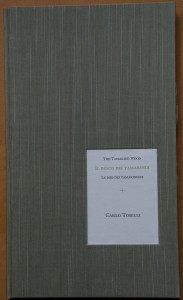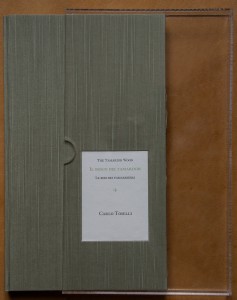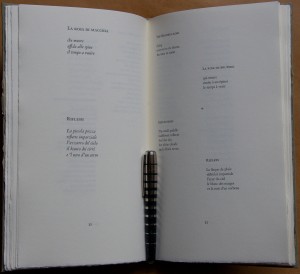In this book of poems, Carlo Toselli helps me answer the question of why I love poetry by dismissing the question. In his poem Senza perché/Without Any Words/Sans pourquoi, he writes:
“I love to offer
words gathered
in little bunches
of roses—
whose beauty
is without any whys”
This poem really stuck with me as it comes up near the end of this book of poetry and seems to strike near the heart of poetry itself.
I don’t know much about Carlo Toselli and couldn’t find much to help me on the internet. What I do know comes from his book of poems entitled Il Bosco dei tamarindi/The Tamarind Wood/Le Bois des Tamariniers published by Le Grazie in 2005.
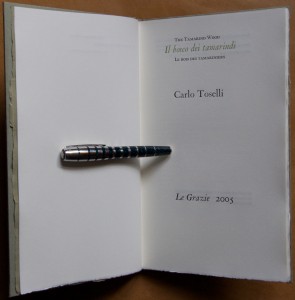 The book was designed and printed for Le Grazie by the Barbarian Press in a tri-lingual format of Italian, English, and French. It is bound in a wonderful Japanese cloth by Simone Mynen with an inlaid title on the front cover that appears to be printed on the same Heine mouldmade paper as is used for the poems. The endpapers are a sumptuous handmade paper from the Papeterie St. Armand in Montréal. Crispin Elsted did the design with the Italian on the verso And the English and French on the recto of each page spread. His wife Jan Elsted printed the pages letterpress. If I have one small nit to pick, it is that there is no spine label on the book or slipcase. Be that as it may, the book won the Limited Editions 1st Prize in the 2005 Alcuin Society Book Design Awards. In fact, the Elsted clan was all over the awards that year as the Barbarian Press Gallipoli tied for 2nd prize and their daughter Apollonia designed and printed the Horse Whisper Press book that took the 3rd prize. You can see the awards here.
The book was designed and printed for Le Grazie by the Barbarian Press in a tri-lingual format of Italian, English, and French. It is bound in a wonderful Japanese cloth by Simone Mynen with an inlaid title on the front cover that appears to be printed on the same Heine mouldmade paper as is used for the poems. The endpapers are a sumptuous handmade paper from the Papeterie St. Armand in Montréal. Crispin Elsted did the design with the Italian on the verso And the English and French on the recto of each page spread. His wife Jan Elsted printed the pages letterpress. If I have one small nit to pick, it is that there is no spine label on the book or slipcase. Be that as it may, the book won the Limited Editions 1st Prize in the 2005 Alcuin Society Book Design Awards. In fact, the Elsted clan was all over the awards that year as the Barbarian Press Gallipoli tied for 2nd prize and their daughter Apollonia designed and printed the Horse Whisper Press book that took the 3rd prize. You can see the awards here.
From what I could see from the Barbarian Press bibliography, Hoi Barbaroi, this is the fourth or fifth book they have designed for Toselli and Le Grazie. I was lucky enough to see a copy when I visited the press in 2008, fell in love with it, and added it to my library.
Since no translator is credited I assume that Toselli does the translations himself, which gives the poems a bit more authenticity than one might get in some translations. I’ve always been fascinated by the difficulty of translating literature, and poetry seems like it would be the toughest task of all. So I always look for bi-lingual books of poetry when I am buying a poet writing in something other than my native English. Then I can puzzle out some of the nuances of the poem’s translation for myself if it happens to be from a language I have a smattering of, like Spanish or French.
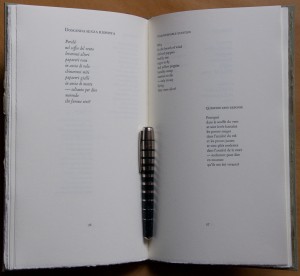 Getting back to the poetry itself, the wildflowers blooming briefly throughout the deserts of California right now also make the poem Unanswerable Question resonate with me. The poppies in the poem teaching us about life as their behavior is
Getting back to the poetry itself, the wildflowers blooming briefly throughout the deserts of California right now also make the poem Unanswerable Question resonate with me. The poppies in the poem teaching us about life as their behavior is
“only to say
dying
they were alive?”
I’ve returned to the poems in this book over and over again, both for the beauty of the poetry and the book itself. The Whole Book Experience, indeed. Going back to the poem I quoted to kick off this review, these are indeed poems
“whose beauty is without any whys”
“la cui bellezza è senza perché”
“don’t la beauté est sans pourquois”
Availability: I haven’t seen any of his books out on the 2nd hand market but with patience one might be able to locate one. The Tamarind Wood was in an edition of 100.

